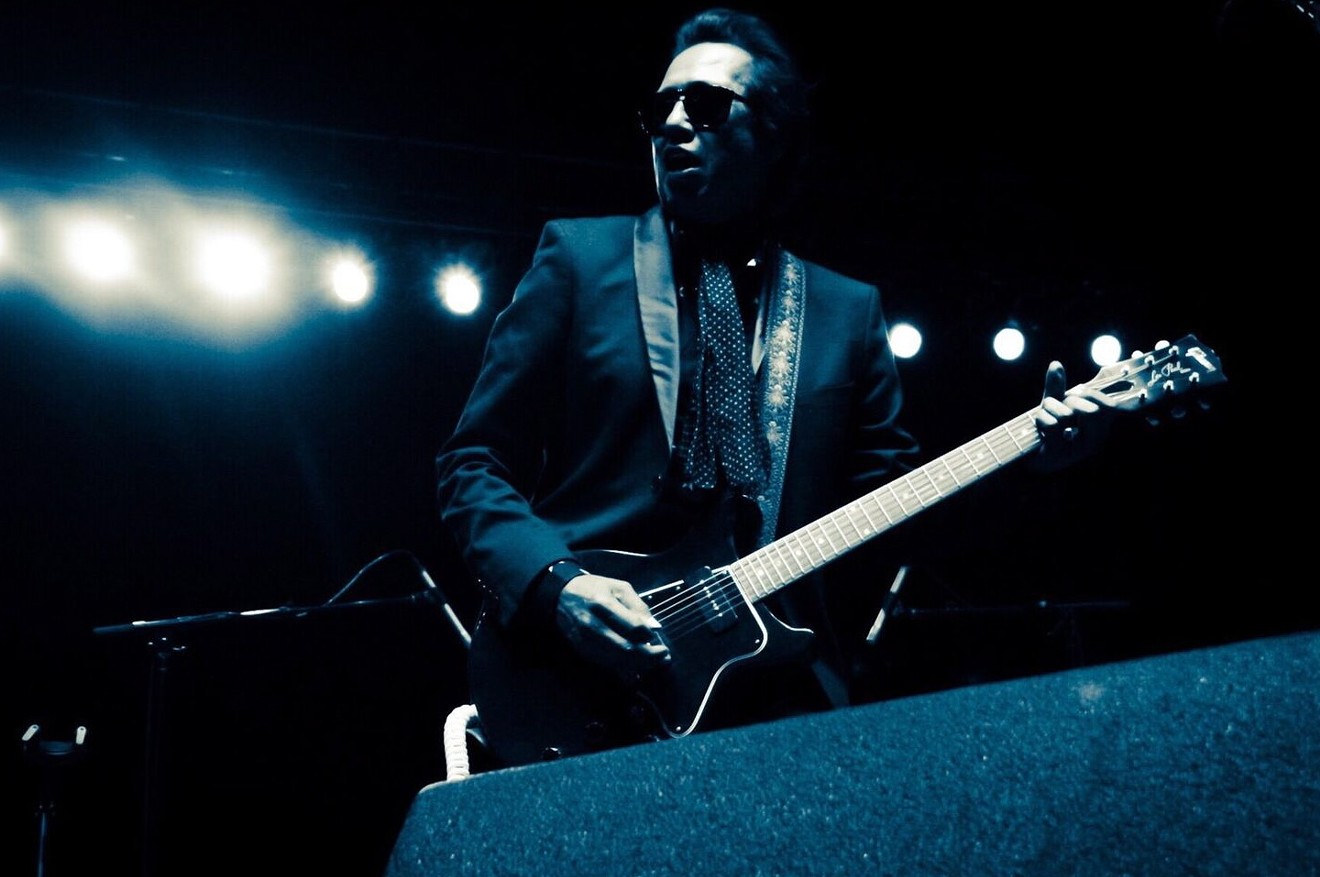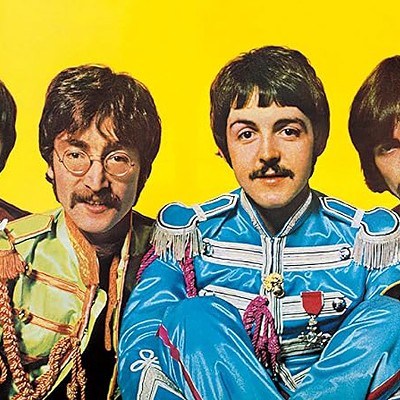Support Us
Houston's independent source of
local news and culture
account
- Welcome,
Insider - Login
- My Account
- My Newsletters
- Contribute
- Contact Us
- Sign out

Alejandro Escovedo Offers The Allure of Poetry and Truth
Photo by Nancy Rankin Escovedo
[
{
"name": "Related Stories / Support Us Combo",
"component": "11591218",
"insertPoint": "4",
"requiredCountToDisplay": "4"
},{
"name": "Air - Billboard - Inline Content",
"component": "11591214",
"insertPoint": "2/3",
"requiredCountToDisplay": "7"
},{
"name": "R1 - Beta - Mobile Only",
"component": "12287027",
"insertPoint": "8",
"requiredCountToDisplay": "8"
},{
"name": "Air - MediumRectangle - Inline Content - Mobile Display Size 2",
"component": "11591215",
"insertPoint": "12",
"requiredCountToDisplay": "12"
},{
"name": "Air - MediumRectangle - Inline Content - Mobile Display Size 2",
"component": "11591215",
"insertPoint": "4th",
"startingPoint": "16",
"requiredCountToDisplay": "12"
}
,{
"name": "RevContent - In Article",
"component": "12527128",
"insertPoint": "3/5",
"requiredCountToDisplay": "5"
}
]
Born into a musical immigrant family, Alejandro Escovedo is a songwriting survivor who can weave together this country’s current tumult with past ghosts like few others. His newest album The Crossing explores characters caught freeze-framed in America’s wayward paths. Yet, much of the inspiration, like many of his smart, infectious albums, stems from stories and history, lore and experience. And that will be crystallized at Mucky Duck, when he performs solo and acoustic on June 19.
The homey dinner and music venue, which straddles Upper Kirby just one block from the often fender-to-fender thickened Highway 59, is one of the longtime venues hosting him since he struck out on his own after True Believers. As mid-1980s stalwarts in Austin’s frenetic clubs and bars, that band cemented his reputation as a rompin’ rock’n’roll guitar renegade, which he still embodies on tunes like “Outlaw for You” and even more so on “Sonica USA,” featuring lauded 1960’s countercultural music visionary Wayne Kramer of MC5.
Earlier in the early 1980s, Escovedo also helped steer dirt-stained Rank and File, whose singer/bassist Tony Kinman died last year. Adamantly more vintage country in their rustic musings, like early Johnny Cash and Johnny Horton with a modern sly quirk, the band became the epicenter of the burgeoning cow-punk genre and shook up Austin’s new wave and indie scenes.
Yet, part of Escovedo remains glued to the attitudes, style, and outlook he honed in his late 1970s excursion with the fiercely artful Nuns, one of the premier bands of punk’s initial shockwave in seedy San Francisco. He readily explored that legacy on his album Real Animal, a breakthrough of sorts that led to live appearances with Bruce Springsteen, where together they unleashed the finely-honed, warmly received rock’n’pop tune “Always a Friend,” penned by Escovedo and Chuck Prophet.
The Crossing is a concept album, sometimes harkening back to With These Hands, his work from the mid-1990s, that blurs fiction and autobiography by telling the tales of an America that is foreboding, troubled, and full of unfinished dreams. Though it takes creative curves, it is fully rooted in very gritty moments of Escovedo’s edgy life.
Plus, it also waxes deeply poetic, as if in a Federico Garcia Lorca frame of mind, about a sense of place. Whereas gay anti-fascist Lorca inspired tunes like “Spanish Bombs” by punk pioneers the Clash and penned poems that tackled Andalusia, Spain, which he described as full of “gypsies, horses, and archangels,” and the Brooklyn Bridge, Escovedo continually peels back emotional layers relating to Texas.
In his own metaphoric lens, he scours the sun-punished borderlands, the nitty-gritty neighborhoods, and venal redneck bars. Each vicinity becomes a synecdoche of love and loathing, of belonging and fear. Texas is the marrow than runs through him, both life-giving and painful.
Many of his lyrics, including new ones, are about broken fathers, troubled youth, bigots, and lawmen, as if he is exploring how men cope with their psyches, and other faulty, even dangerous men, in desperate times. And the result is stark powerful lines like “America is beautiful, America is ill ... America is a bloodstain in a honky tonk kill” found in the alluring tune “Teenage Luggage.”
Other lyrics, like “Silver City,” explore journeys fraught with possibility and peril. Throughout his catalog, he has plumbed his family’s journey to America, his brash youthful journey through punk rock (the Nuns, time spent at Chelsea Hotel, Rank and File), and his harrowing journey through the aftermath of his wife’s death. Each such storyline becomes a ring of wood in his output, a layer of symbolism and searching.
Also throughout his career, Escovedo has partially rebuilt his music and reinvented himself, finding a steady presence in being inventive but never forsaking his sense of a modern dark serenade. Sometimes his albums are rich in production values, sometimes stripped to the bone, like the live work More Miles Than Money. Others rock to the hilt, like A Man Under the Influence, while some experiment in sound and vision, like The Boxing Mirror.
Altogether, his songs seem both offhand and meticulous, inked on the back of a hotel receipt or restaurant napkin, yet carved in careful lines under the moon too. They wax specific but universal as well, stemming from eyewitness truths but bending the tales to find deeper impressions. Any Hispanic immigrant could be the kid facing a former Texas Ranger with yellow teeth and deep-down prejudice found in the spoken-word “Rio Navidad.”
The Crossing tends to merge worlds, manners, and impressions. It feels like correspondence from an America bruised and roughened from injustice. Though his meditations seem lore inducing, or trancelike, they quickly strip mystery of its opaqueness. On “Footsteps in the Shadows,” dark shapes dancing across the tree line during a storm’s impending blitzkrieg actually indicate men with hounds chasing down people.
The tune is ominous and engrossing. The hunters know nothing of the lives they hound, batter, and terrify. It reveals the flipside of this country’s history – its naked animosity towards the vulnerable.
Much of the album works through an unsettling mishmash of burning cigarettes, honky tonk jails, and shitty guitars. Escovedo does not skimp on details: he enters into the maps of a Hispanic emotional topography and brings a human touch to bear on the conflicts. Texas is not the Lone Star state of highly exaggerated largesse— pine thickets and expansive prairies, cattle ranches, big cars, and spurts of oil — it is a slice of Mexico removed by war and treaty. It is an old country, mythic, a mother.
That’s what Escovedo explores with tuning fork clairvoyance, just as he is able to find easygoing reference points — reels that spin with the contributions of Hispanics to rock’n’roll’s underbelly. That is why he calls out the Zeros, the all-Hispanic punk originators from 1976 featuring his brother Javier Escovedo, in the lyrics of "Sonica USA." That band that acted as a ballast, keeping music meaningful in an era of stadium rock mediocrity.
With such gumption and respect, Escovedo documents how Hispanics made music that pushed back against monolithic monoculture. They were wild seeds.
When Escovedo shouts out, he is not simply paying tribute or looking back, with an earnest, hard-fought wink; it’s about revering, in a very tensile, tactile, and spirited way, the resilience of a counterculture often undergirded by Hispanics. Since this may have gone unnoticed by many, even as punk legends like Alice Bag and El Vez (the alias of Robert Lopez of the Zeros) have spent years reclaiming such stories, Escovedo makes it a cornerstone on The Crossing.
In the end, Escovedo seems indifferent to the dodgy psychology of here-and-now Instagram memes and Twitter fake furor. He is far more invested in the steady gravity of truths distilled in songs and news that is always news. He tries to undo the dead weight of time. In the arc of his narratives, it does not matter if tragedy unfolded ten minutes ago or in a crinkled crevice of the past.
His tunes make the pain, the suffering, the hiding, the exodus, the mingling, and the living, all the bitter rides and hardened solace, as well as the joy, feel immediate, close to the skin, and undimmed. He offers a skeptical coda to the idea that anybody is making America great again.
Alejandro Escovedo is scheduled to perform July 19 at for 7 and 9:30 p.m.at McGonigel’s Mucky Duck, 2425 Norfolk, 713-521-0521. For information, call 713-528-5999 or visit mcgonigels.com. $40 plus fees.
KEEP THE HOUSTON PRESS FREE...
Since we started the Houston Press, it has been defined as the free, independent voice of Houston, and we'd like to keep it that way. With local media under siege, it's more important than ever for us to rally support behind funding our local journalism. You can help by participating in our "I Support" program, allowing us to keep offering readers access to our incisive coverage of local news, food and culture with no paywalls.
David Ensminger
Trending Music
- The Way it Was: Rage Against the Machine, Evil Empire
- After Some Time on the Shelf, Jesse Dayton's Album The Hard Way Blues is Ready for Release
- Dave Wakeling Brings His English Beat to Cactus Music & Bayou Center
-
Sponsored Content From: [%sponsoredBy%]
[%title%]

Don't Miss Out
SIGN UP for the latest
Music
news, free stuff and more!
Become a member to support the independent voice of Houston
and help keep the future of the Houston Press FREE
Use of this website constitutes acceptance of our
terms of use,
our cookies policy, and our
privacy policy
The Houston Press may earn a portion of sales from products & services purchased through links on our site from our
affiliate partners.
©2024
Houston Press, LP. All rights reserved.




